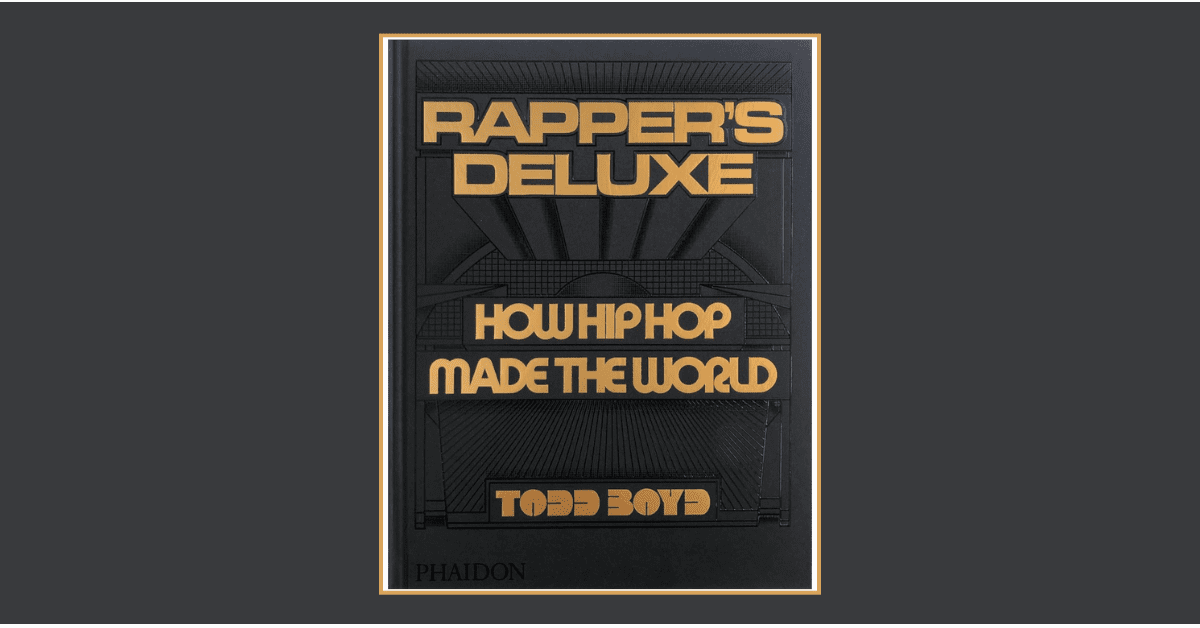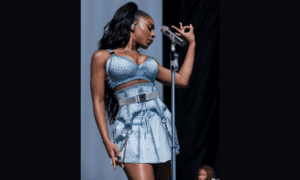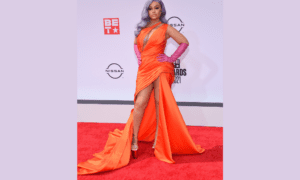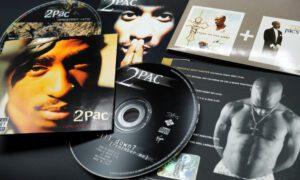
Rapper’s Deluxe | A Scholarly Exploration with Dr. Todd Boyd
In the captivating new book release, Rapper’s Deluxe, Dr. Todd Boyd, also known as the Notorious Ph.D., delves into the extraordinary journey of hip-hop from its roots as an underground movement to its current status as a global cultural powerhouse. Dr. Boyd earned the moniker Notorious PhD, and Rapper’s Deluxe: How Hip Hop Made the World proves himself to be a bona fide rap historian.
Background on Dr. Todd Boyd, Rapper’s Deluxe, and Phaidon
Published by Phaidon, renowned for its rich catalog of creative arts, this book marks a significant addition to their illustrious collection. Dr. Boyd, the Price Chair for the Study of Race and Popular Culture and a Professor of Cinema and Media Studies at USC, brings his extensive expertise to explore hip-hop’s profound influence on American culture and beyond. His commentary has enhanced documentaries like The Last Dance and Muhammed Ali, and his scholarly work spans seven books and numerous prestigious publications and programs, including The New York Times, NPR, NBC Nightly News, and many more.
‘Rap is what you do, hip hop is what you are.’
This axiom by Dr. Boyd encapsulates the essence of his latest work, Rapper’s Deluxe. The book is a visual and cultural odyssey, charting hip-hop’s meteoric rise and its indelible mark on global culture. Organized by decades, from the 1970s to the present, it narrates the evolution of this vibrant culture through pivotal moments and figures, from “God MC” Rakim to the unforgettable hip-hop all-stars at the 2022 Super Bowl Half Time Show.
A Book for Any Home
Rapper’s Deluxe: How Hip Hop Made the World is a one-part coffee table book replete with gorgeous imagery and a one-part illuminating series of essays tracing hip-hop’s origins, influences, and the future of the genre. Consider a beginner’s guide to hip-hop history and influences or advanced reading for aficionados. The book is out now through Phaidon or on Amazon (paid link).
A Historical Party and Its Cultural Echoes
The conversation takes us back to a defining moment in hip-hop’s genesis—the legendary party thrown by DJ Kool Herc in 1973, marking the unofficial birth of the genre. Boyd’s curiosity about the cultural context surrounding this event led to an intriguing discovery:
“I found out that Pam Grier’s film, Coffy, was the number one movie at the box office at that same time.”
he notes, drawing a parallel between the underground hip-hop scene and mainstream cinema to illustrate the interconnectedness of cultural expressions during the era. Coffy is a seminal blaxploitation film.
Blaxploitation & Hip-Hop

Rapper’s Deluxe. How Hip Hop Made The World. Dr. Todd Boyd. Phaidon. Right On For the Darkness: The 1970s: Blaxploitation. Book design by 12:01- Office of Hassan Rahim
The blaxploitation era of the 1970s, with its distinctive blend of funk soundtracks, urban narratives, and black empowerment themes, significantly influenced the development of hip-hop culture. Dr. Todd Boyd, in his exploration of hip-hop’s roots, delves into how this film genre not only mirrored the socio-political landscape of its time but also laid the groundwork for hip-hop’s thematic and aesthetic sensibilities.
“Blaxploitation films were really about showcasing black protagonists in a manner that hadn’t been seen before,” Boyd explains. “They took the black experience and placed it front and center, in stories that combined action, social commentary, and a kind of style that was unmistakable.”
Celebration of Black Identity
This celebration of black identity and challenge to societal norms resonated with the early architects of hip-hop, who were navigating similar themes in their music and culture. Boyd highlights the seamless connection between the two,
“What else was going on during the time that this party is being held? And in my research, I found out that Pam Grier’s film, ‘Coffy,’ was the number one movie at the box office at that same time.”
This overlap between a burgeoning hip-hop scene and the peak of blaxploitation cinema illustrates the cultural synergy from which hip-hop emerged. The influence of blaxploitation on hip-hop extends beyond thematic parallels; it’s also evident in the music itself.
“A lot of the influences that I talk about in the 70s, you know, in future decades, by the 80s, certainly by the 90s, you start to see evidence of these influences appearing in hip-hop culture through lyrics and videos and other references,” Boyd notes.
The gritty, raw, and unapologetically black soundtracks of blaxploitation films, characterized by artists like Isaac Hayes and Curtis Mayfield, provided a rich source for hip-hop sampling, further cementing the connection between the two.
Furthermore, Boyd emphasizes the portrayal of blaxploitation heroes who, much like hip-hop artists, navigated and triumphed over the challenges of urban life.
“Blaxploitation characters often triumphed over circumstances they found in front of them, and so they were heroic for audiences of people who really had never been marketed to before.”
The legacy of blaxploitation in hip-hop is a testament to the genre’s impact on shaping the narrative and sound of hip-hop.
“These movies were above ground. This is the top movie in the country. So I thought, this is an interesting way of thinking about the evolution of hip hop.”
Sampling Blaxploitation
Through sampling, storytelling, and an unabashed embrace of black culture, hip-hop artists have continued to draw from the well of blaxploitation, paying homage to its influence while charting new creative territories.
In Dr. Todd Boyd’s analysis, the intertwining histories of blaxploitation cinema and hip-hop culture highlight a shared lineage of resistance, innovation, and black expression. As hip-hop continues to evolve, the foundational influence of blaxploitation remains a vibrant thread in its complex tapestry, underscoring the enduring power of cultural cross-pollination. Boyd further delves into the thematic and musical influence of Superfly, pointing out,
“Superfly is my favorite blaxploitation soundtrack,”
This underscores the genre’s role in shaping hip-hop’s narrative and aesthetic sensibilities. Through his insights, Boyd and Rapper’s Deluxe demonstrates how Blaxploitation’s rich, soulful soundtracks and thematic underpinnings of struggle and empowerment profoundly impacted hip-hop’s development, blending visual and auditory elements to lay foundational stones for the genre’s evolution. The Mack is Dr. Boyd’s second favorite Blaxploitation film.
Iceberg Slim: Pimpin’ Ain’t Dead
Rapper’s Deluxe and Dr. Todd Boyd illuminates the significant influence of Iceberg Slim, a pivotal figure in the nexus between literature and hip-hop culture. He explains,
“Iceberg Slim was a writer, a gentleman by the name of Robert Beck…his writings were … we might call street literature.”
Dr. Todd Boyd elaborates on Slim’s transformation from a former pimp to a celebrated author, noting the profound impact of his novel “Pimp” on hip-hop’s narrative and thematic depth. Through Slim’s vivid storytelling and raw portrayal of street life, Boyd underscores how Slim’s literary legacy has permeated hip-hop and Blaxploitation film, inspiring artists and shaping the genre’s lyrical and thematic complexity.
Iceberg Slim would influence Jay-Z (his original rap name: Iceberg Slim), Pimp C, Too Short, Three 6 Mafia, Snoop Dogg, and more.

Iceberg Slim influence on hip-hop artists, courtesy of hip-hop-history.com
The writer/pimp went on to create a spoken word album, a precursor to hip-hop. Reflections is a great place to start. However, Pimp: The Story of My Life or
Influential Precursors and Hip-Hop’s Evolution
Dr. Todd Boyd highlights the foundational role of figures like Muhammad Ali, The Last Poets, and Gil Scott Heron, whose work predated and paved the way for hip-hop.
“These figures weren’t rappers… But they are, I think, inspirational and influential figures in terms of what would become rap music,”
Boyd states, underlining the continuum of Black artistic expression that hip-hop inherited and transformed.
The Dichotomy of Commercialism and Authenticity
Reflecting on hip-hop’s commercial aspects, Boyd acknowledges the genre’s adaptability, from its early novelty raps to today’s viral TikTok hits. He observes that back in the 80s,
“the opportunistic commercialism… was at a point when there wasn’t as much other substantive hip hop music available,”
critiquing the early commercial exploitation while recognizing hip-hop’s resilience and its ability to maintain depth and authenticity.
Sampling: An Art Form of Renewal and Reverence
Dr. Todd Boyd defends the art of sampling in hip-hop in Rapper’s Deluxe against criticisms of laziness, arguing for its creativity and homage to musical forebears.
“The best sampling to me is creative… you take it and you maybe add elements to it,”
he asserts, championing the transformative power of sampling in crafting new, meaningful works from existing materials.
Veterans of Hip-Hop and the Bridge to the Present
The importance of hip-hop’s pioneers, like Nas and Jay-Z, in linking the genre’s rich history with its vibrant present is underscored by Rapper’s Deluxe. Their ongoing contributions, he suggests, “indicates that there’s a history to this,” emphasizing the essential role of these figures in preserving hip-hop’s legacy while fostering its evolution.
The Wu-Tang Clan: A Unique Force in Hip-Hop Culture

From left: Divine, Raekwon, and Ghostface Killah behind the Kentish TownForum, London, September 1994, photographer Eddie Otchere. Picturecredit: Eddie Otchere (page 163, bottom right)
In the expansive landscape of hip-hop, few groups have left an indelible mark as profoundly as the Wu-Tang Clan. Dr. Todd Boyd, in his detailed exploration of hip-hop’s evolution, delves into the unique contribution of this iconic group, highlighting their unmatched influence on the genre.
“The Wu-Tang Clan came along at a very sort of interesting period of time.”
Emerging during a phase when the West Coast’s grip on hip-hop was undeniable, Wu-Tang’s rise signaled a pivotal eastward shift, bringing the focus back to New York and, by extension, enriching the genre’s diversity.
What Made Wu-Tang Clan Unique and Special
What set the Wu-Tang Clan apart was not just their music but their collective approach. Boyd elaborates on their strategy, “we formed like Voltron,” illustrating how each member brought a distinct flavor, yet together, they created something unprecedented. This unity, coupled with their solo ventures, underscored the group’s innovative spirit.
Moreover, Boyd highlights Wu-Tang’s unique blend of black street culture with martial arts mythology.
“This merger of black hip-hop culture and martial arts culture was brilliant.”
It wasn’t just their music that captivated audiences but their entire aesthetic, deeply rooted in the films and cultural motifs that resonated with urban communities in the 1970s.
Wu-Tang: Beyond Hip-Hop
The Wu-Tang Clan’s influence, according to Rapper’s Deluxe, extends beyond music. They encapsulated a cultural movement, intertwining the rebellious energy of hip-hop with narratives that spoke to and for their communities. Their contribution to hip-hop’s narrative complexity and innovative use of the Wu-Tang member’s alter egos and storytelling set a new standard for the genre.
Dr. Todd Boyd on Wu-Tang’s Legacy
In the broader context of hip-hop’s history, the Wu-Tang Clan represents a critical bridge between past and present, embodying the genre’s capacity for reinvention and cultural commentary. Dr. Boyd’s insights into their impact not only celebrate their legacy but also underscore the enduring relevance of their approach to hip-hop culture.
I think Wu-Tang came along at a time. The West Coast had become the kind of center of gravity in hip hop, you know, thanks to NWA, of course Ice Cube and Dr. Dre, and eventually Snoop and others. But the West Coast had kind of shifted the terrain of hip hop in the late 80s, early 90s. And it was having just an unprecedented run and at some point I think it’s the emergence of Nas and Wu-Tang and ultimately biggie that kind of helps the east coast come back into the equation in a significant way.
The Rise of Women in Hip-Hop
Dr. Todd Boyd celebrates the increasing prominence of women in hip-hop, viewing it as a sign of the genre’s expanding inclusivity. “It’s inevitable, you know, at some point this had to happen,” he remarks, acknowledging the vital contributions of female artists to hip-hop’s dynamism and cultural relevance.
Conclusion: A Living, Breathing Culture
Hip-hop’s influence is ubiquitous, shaping industries and shifting paradigms in once unimaginable ways. From the streets of New York to the global stage, it has crafted a new cultural landscape that seamlessly blends Black culture with urban street life, luxury, and more. Told with Dr. Boyd’s characteristic flair, Rapper’s Deluxe is more than merely a history of hip-hop but a vibrant celebration of its power to transcend boundaries and defy expectations.
As hip-hop continues to evolve and influence, Rapper’s Deluxe: How Hip Hop Made the World is a crucial text, documenting its legacy and ongoing journey. Through Phaidon’s partnership, readers are invited to engage with this monumental work, exploring hip-hop’s indelible impact on the world’s cultural canon.
Buy Rapper’s Deluxe by Dr. Todd Boyd for your self or any hip-hop-obsessed loved ones:












